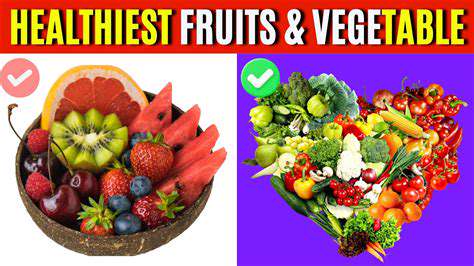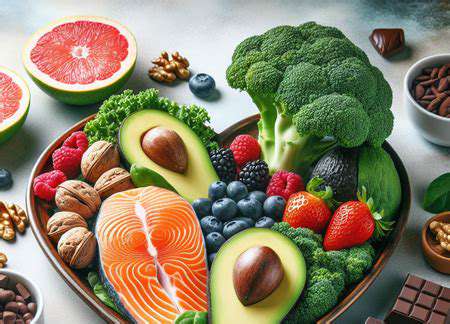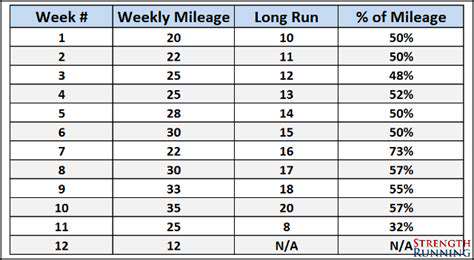Best Foods for Gut Health and Digestion
Fruits and Vegetables: Nutrient Powerhouses for Digestion

Fruits and Vegetables: A Nutritional Powerhouse
Fruits and vegetables are essential components of a healthy diet, providing a wide array of vitamins, minerals, and antioxidants crucial for optimal bodily function. These vibrant foods are packed with nutrients that support various bodily processes, from boosting the immune system to maintaining healthy skin and eyes. Their consumption is directly linked to a reduced risk of chronic diseases like heart disease and certain cancers.
A diverse intake of fruits and vegetables is key to reaping their full nutritional benefits. Different fruits and vegetables offer unique combinations of vitamins and minerals. For example, leafy greens are excellent sources of vitamin K, while berries are rich in antioxidants. Understanding the nutritional profiles of various options allows for a more strategic approach to achieving a balanced diet.
Vitamins and Minerals in Fruits and Vegetables
Fruits and vegetables are remarkable sources of essential vitamins and minerals. Vitamin C, found abundantly in citrus fruits, berries, and bell peppers, is a potent antioxidant that supports collagen production and immune function. Similarly, vitamin A, crucial for eye health and immune function, is prevalent in carrots, sweet potatoes, and leafy greens. These vitamins, along with other vital nutrients, play a crucial role in maintaining overall health and well-being.
The mineral content of fruits and vegetables is equally impressive. Potassium, found in bananas, avocados, and sweet potatoes, is essential for maintaining healthy blood pressure levels. Magnesium, prevalent in leafy greens, nuts, and seeds, plays a critical role in muscle function and energy production. These minerals, along with others, contribute to the overall health and well-being of the body.
Benefits of Including Fruits and Vegetables in Your Diet
Incorporating fruits and vegetables into your daily diet offers a wide range of health benefits. They are low in calories and fat, making them an excellent choice for weight management. Furthermore, the high fiber content in fruits and vegetables aids digestion and promotes healthy bowel movements, preventing constipation. These foods are essential for maintaining a healthy gut microbiome.
Beyond weight management and digestive health, fruits and vegetables are also important for preventing chronic diseases. Their antioxidant properties help protect cells from damage, reducing the risk of various diseases. A diet rich in fruits and vegetables is strongly associated with a lower risk of heart disease, stroke, and some types of cancer. These benefits underscore the importance of prioritizing fruits and vegetables in your dietary choices.
Dietary Considerations for Fruits and Vegetables
When incorporating fruits and vegetables into your diet, consider factors like preparation methods and storage. Cooking methods can impact nutrient retention, so understanding how different cooking techniques affect the nutritional value of various fruits and vegetables is beneficial. Proper storage is also crucial for maintaining freshness and maximizing nutrient content. Considering these factors helps ensure optimal nutritional intake from your fruit and vegetable consumption.
Let's face it - in today's information-saturated world, you've got about three seconds to make an impression. That's why crafting an irresistible opening isn't just important; it's absolutely critical. Your introduction isn't merely the start of your piece - it's the make-or-break moment that determines whether anyone will keep reading. Think about how you personally engage with content online. When was the last time you kept reading something that didn't immediately grab you?
Probiotic-Rich Foods: Supporting Digestive Balance
Fermented Foods: A Treasure Trove of Probiotics
Fermented foods, like yogurt, kefir, sauerkraut, and kimchi, are excellent sources of beneficial bacteria. These microorganisms, known as probiotics, play a crucial role in maintaining a healthy gut microbiome. The fermentation process not only preserves food but also creates an environment where these beneficial bacteria thrive. This process essentially cultivates a rich ecosystem of probiotics, contributing to digestive balance and overall well-being. Incorporating fermented foods into your diet can be a simple and effective way to support a healthy gut.
These fermented foods offer a wide variety of flavors and textures, allowing you to incorporate them into your daily meals in a satisfying way. They can be enjoyed as part of a meal, in a salad, or even as a standalone snack. Their probiotic content contributes to a healthier gut environment, supporting digestion and potentially boosting the immune system. Beyond their probiotic benefits, fermented foods often contain essential vitamins and minerals, making them a nutritious addition to any diet.
Dairy Products: A Familiar Source of Probiotics
Certain dairy products, such as yogurt and some cheeses, are naturally rich in probiotics. These foods contain live and active cultures of beneficial bacteria, which are crucial for supporting a healthy gut microbiome. The presence of these probiotics can aid in digestion, promote regularity, and potentially contribute to a stronger immune system. The calcium and protein content in dairy products further contributes to overall health and well-being.
While not all dairy products are probiotic-rich, certain types are specifically cultivated to contain beneficial bacteria. This targeted cultivation enhances their probiotic content, making them valuable additions to a diet focused on gut health. Choosing yogurt with live and active cultures is key to maximizing the probiotic benefits. Look for labels that clearly indicate the presence of specific probiotic strains.
Plant-Based Options: Beyond Dairy
Probiotic-rich options extend beyond dairy and fermented foods. Many plant-based foods, like certain vegetables and fruits, can contribute to a healthy gut microbiome, supporting digestive balance. Prebiotics, non-digestible fibers, are also crucial for stimulating the growth of beneficial bacteria in the gut. These prebiotics act as food for the probiotics, fostering a thriving gut ecosystem. Incorporating a variety of fruits and vegetables into your diet can be a significant step towards promoting gut health.
Fruits like bananas, berries, and apples, and vegetables such as asparagus, onions, and leeks are excellent sources of prebiotics. These foods, rich in fiber, not only aid digestion but also contribute to a balanced gut microbiome. A diverse diet, encompassing a range of plant-based foods, can significantly support the growth and maintenance of beneficial bacteria in the gut. This, in turn, contributes to a healthy digestive system and overall well-being.
Other Considerations: Beyond Specific Foods
While specific foods are valuable sources of probiotics, maintaining a balanced diet is key to supporting digestive health. Prioritizing whole, unprocessed foods over highly processed options is crucial. A diet rich in fruits, vegetables, whole grains, and lean proteins provides the necessary nutrients and fiber to support a healthy gut. Limiting processed foods, sugary drinks, and excessive alcohol consumption can also positively impact the gut microbiome.
Stress management and adequate sleep are also important factors influencing gut health. The gut-brain connection highlights the interplay between mental and physical well-being. Managing stress levels through relaxation techniques and ensuring sufficient sleep can contribute to a healthier gut microbiome and improved overall health. These lifestyle factors, along with a balanced diet, contribute to a more supportive environment for a healthy gut.
Read more about Best Foods for Gut Health and Digestion
Hot Recommendations
-
*Guide to Managing Gout Through Diet
-
*Best Habits for Financial Well being
-
*How to Build a Routine for Better Mental Health
-
*How to Eat Healthy on a Budget [Tips & Meal Ideas]
-
*Guide to Practicing Self Acceptance
-
*How to Incorporate More Movement Into Your Day
-
*Guide to Managing Chronic Pain Naturally
-
*Guide to Building a Reading Habit for Well being
-
*Top 5 Weight Loss Supplements That Actually Work
-
*Best Exercises for Postpartum Recovery [Beyond Abdominal Work]


![Best Meditation Apps for Beginners [2025 Review]](/static/images/26/2025-05/Top3MeditationAppsforBeginnersin2025.jpg)

![HIIT Workout for Fat Loss [20 Minute Routine]](/static/images/26/2025-05/Exercises28Example293A.jpg)






